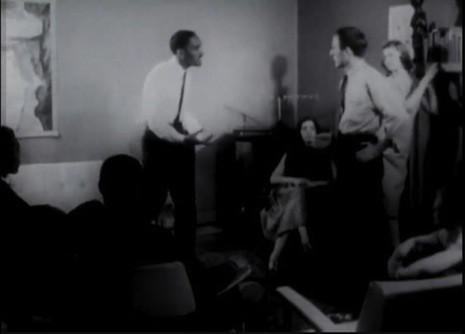
Alex the musician breaks it down for the bohos in The Cry of Jazz
Ed Bland died on March 14 at 86. Here’s a piece from Dangerous Minds’ archives by Ron Nachman on Mr. Bland’s legendary short film The Cry Of Jazz.
With the supposed “national conversation on race” now devolved into a debate about who’s allowed to use the N-word, it’s instructive to have a look at Chicago musician and historian Ed Bland’s 1959 film polemic The Cry of Jazz.
Co-written by Bland alongside urban planner Nelam Hill, novelist Mark Kennedy, and mathematician Eugene Titus, the half-hour-long Cry… is fashioned as an impromptu lecture by jazz musician Alex (backed by two fellow male African-American friends) to two male and two female white bohemians lingering after a jazz appreciation salon. Cut in to the lecture is footage of both Chicago inner-city life at the time, and early performances by Sun Ra and his Arkestra. As you’ll see below, the conversation—though generally civil and high-minded—gets frank and heated in a way that few would imagine it did back in the day.
In his recent introduction to a screening of the film, critic Armond White contends that Cry of Jazz has been “lost” because it’s retained its provocativeness. He also contended that it was a response to the romanticism of Norman Mailer’s essay “The White Negro” and a dramatized snapshot of the “tension and fractiousness” inside the bohemian community of the time.
Jazz is dead because the experience and suffering of American life on the Negro have to die. The spirit of jazz is alive because the Negro’s spirit must endure.
—Alex, from The Cry of Jazz
In strictly musical terms, Bland’s pronouncement of the death of jazz is both trenchant and puzzling. In one way, it seems literally true—the year 1959 saw the passing of Sidney Bechet, alongside the deaths under more tragic circumstances of Lester “Prez” Young and Billie Holiday. But Bland’s death warrant is also rather undercut by the release that year of canonic albums like John Coltrane’s Giant Steps, Miles Davis’s Kind of Blue, and—ironically enough—Ornette Coleman’s The Shape of Jazz to Come.
“Jazz is dead because the experience and suffering of American life on the Negro have to die,” says the Alex character. “The spirit of jazz is alive because the Negro’s spirit must endure.” With the Montgomery Bus Boycott and Little Rock in the background and the Woolworth sit-ins and Civil Rights Act in the offing, Bland outlines key sono-sociological points that would inform the freedom principle behind the soundtrack of both the civil rights and black power struggles.
Through melodic improvisation and the ever-present conflict in rhythm, the Negro makes an artform that insists on a deification of the present, and which—among other things—is an unconscious holding action until he is also master of his future.
—Alex, from The Cry of Jazz
There are tons of other highly memorable quotes in The Cry of Jazz. Do yourself a favor and check out this little-known but significant piece.
Thanks to Mixmaster Morris for the heads-up on this…